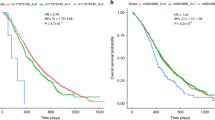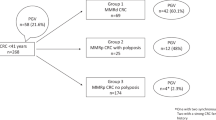Abstract
Hereditary non-polyposis colorectal cancer (HNPCC) or Lynch syndrome is characterized by inactivating germline mutations in DNA mismatch repair genes resulting in an increased risk of developing an epithelial malignancy. There is considerable variability in disease expression observed in this syndrome, which is thought to be due to a combination of genetic and environmental factors. Alterations in the kinetics of methylene tetrahydrofolate reductase (MTHFR) due to the presence of polymorphisms in the MTHFR gene have been associated with an increased risk of colorectal cancer (CRC). Two common single nucleotide polymorphisms (SNPs) located within the MTHFR gene, 677 C>T and 1298 A>C, that alter the function of the encoded protein have been the focus of many studies on CRC risk outside the context of an inherited predisposition to disease. In this report, a total of 417 HNPCC participants were genotyped for the 677 C>T and 1298 A>C SNPs to determine whether there exists an association with the age of disease onset of CRC. Genotyping of both SNPs was performed by TaqMan® assay technology. Associations in disease risk were further investigated using Kaplan–Meier survival analysis and Cox hazard regression. The average ages of disease diagnosis were found to be different between individuals harbouring either one of the MTHFR polymorphisms. Both Kaplan–Meier and Cox hazard regression analyses revealed a more complex relationship between the two polymorphisms and the age of CRC onset. The Kaplan–Meier survival analysis revealed that compound heterozygotes for the two SNPs developed CRC 10 years later compared with those carrying only wild-type alleles.
Similar content being viewed by others
Log in or create a free account to read this content
Gain free access to this article, as well as selected content from this journal and more on nature.com
or
References
de la Chapelle A : Genetic predisposition to colorectal cancer. Nat Rev Cancer 2004; 4: 769–780.
Peltomaki P : Deficient DNA mismatch repair: a common etiologic factor for colon cancer. Hum Mol Genet 2001; 10: 735–740.
Scott RJ, McPhillips M, Meldrum C et al: Hereditary nonpolyposis colorectal cancer in 95 families: differences and similarities between mutation-positive and mutation-negative kindreds. Am J Hum Genet 2001; 8: 118–127.
Alarcon F, Lasset C, Carayol J et al: Estimating cancer risk in HNPCC by the GRL method. Eur J Hum Genet 2007; 15: 831–836.
Aaltonen LA, Salovaara R, Kristo P et al: Incidence of hereditary nonpolyposis colorectal cancer and the feasibility of molecular screening for the disease. N Engl J Med 1998; 338: 1481–1487.
Samowitz WS, Curtin K, Lin HH et al: The colon cancer burden of genetically defined hereditary nonpolyposis colon cancer. Gastroenterology 2001; 121: 830–838.
DeFrancisco J, Grady WM : Diagnosis and management of hereditary non-polyposis colon cancer. Gastrointest Endosc 2003; 58: 390–408.
Plaschke J, Schwanebeck U, Pistorius S, Saeger HD, Schackert HK : Methylenetetrahydrofolate reductase polymorphisms and risk of sporadic and hereditary colorectal cancer with or without microsatellite instability. Cancer Lett 2003; 191: 179–185.
Brockton NT : Localized depletion: the key to colorectal cancer risk mediated by MTHFR genotype and folate? Cancer Causes Control 2006; 17: 1005–1016.
Blount BC, Mack MM, Wehr CM et al: Folate deficiency causes uracil misincorporation into human DNA and chromosome breakage: implications for cancer and neuronal damage. Proc Natl Acad Sci USA 1997; 94: 3290–3295.
Stern LL, Mason JB, Selhub J, Choi SW : Genomic DNA hypomethylation, a characteristic of most cancers, is present in peripheral leukocytes of individuals who are homozygous for the 677C>T polymorphism in the methylenetetrahydrofolate reductase gene. Cancer Epidemiol Biomarkers Prev 2000; 9: 849–853.
van der Put NM, Gabreels F, Stevens EMB et al: A second common mutation in the methylenetetrahydrofolate reductase gene: an additional risk factor for neural-tube defects? Am J Hum Genet 1998; 62: 1044–1051.
Weisberg I, Tran P, Christensen B, Sibani R, Rozen R : A second genetic polymorphism in methylenetetrahydrofolate reductase (MTHFR) associated with decreased enzyme activity. Mol Genet Metab 1998; 64: 169–172.
Weisberg IS, Jacques PF, Selhub J et al: The 1298A → C polymorphism in methylenetetrahydrofolate reductase (MTHFR): in vitro expression and association with homocysteine. Atherosclerosis 2001; 156: 409–415.
Le Marchand L, Donlon T, Hankin JH, Kolonel LN, Wilkens LR, Seifried A : B-vitamin intake, metabolic genes, and colorectal cancer risk (United States). Cancer Causes Control 2002; 13: 239–248.
Mitrou PN, Watson MA, Loktionov AS et al: MTHFR (677C>T and 1298A>C) polymorphisms and risk of sporadic distal colorectal adenoma in the UK Flexible Sigmoidoscopy Screening Trial (United Kingdom). Cancer Causes Control 2006; 17: 793–801.
Hubner RA, Houlston RS : MTHFR 677C>T and colorectal cancer risk: a meta-analysis of 25 populations. Int J Cancer 2007; 120: 1027–1035.
Pande M, Chen J, Amos CI, Lynch PM, Broaddus R, Frazier ML : Influence of methylenetetrahydrofolate reductase gene polymorphisms 677C>T and 1298A>C on age-associated risk for colorectal cancer in a Caucasian lynch syndrome population. Cancer Epidemiol Biomarkers Prev 2007; 16: 1753–1759.
Frosst P, Blom HJ, Milos R et al: A candidate genetic risk factor for vascular disease: a common mutation in methylenetetrahydrofolate reductase. Nat Genet 1995; 10: 111–113.
Kang SS, Zhou J, Wong PWK, Kowalisyn J, Strokaosch G : Intermediate homocysteinemia: a thermolabile variant of methylenetetrahydrofolate reductase. Am J Hum Genet 1988; 43: 414–421.
Shan X, Wang L, Hoffmaster R, Kruger WD : Functional characterization of human methylenetetrahydrofolate reductase in Saccharomyces cerevisiae. J Biol Chem 1999; 274: 32613–32618.
Tregouet D-A, Tiret L : Cox proportional hazards survival regression in haplotype-based association analysis using the Stochastic-EM algorithm. Eur J Hum Genet 2004; 12: 971–974.
Kim YI : Folate and colorectal cancer: an evidence-based critical review. Mol Nutr Food Res 2007; 51: 267–292.
Acknowledgements
We acknowledge the support to the University of Newcastle, the Hunter Medical Research Institute and the Centre for Information Based Medicine in funding this study. We also thank the participants in the study for allowing their DNA to be used for further research into this disease.
Author information
Authors and Affiliations
Corresponding author
Rights and permissions
About this article
Cite this article
Reeves, S., Meldrum, C., Groombridge, C. et al. MTHFR 677 C>T and 1298 A>C polymorphisms and the age of onset of colorectal cancer in hereditary nonpolyposis colorectal cancer. Eur J Hum Genet 17, 629–635 (2009). https://doi.org/10.1038/ejhg.2008.239
Received:
Revised:
Accepted:
Published:
Issue date:
DOI: https://doi.org/10.1038/ejhg.2008.239
Keywords
This article is cited by
-
MTHFR C677T and A1298C polymorphism’s effect on risk of colorectal cancer in Lynch syndrome
Scientific Reports (2023)
-
Reduced folate carrier-1 G80a gene polymorphism is associated with neuroblastoma’s development
Molecular Biology Reports (2014)
-
Genetic modifiers of cancer risk in Lynch syndrome: a review
Familial Cancer (2013)
-
MTHFR C677T polymorphism contributes to colorectal cancer susceptibility: evidence from 61 case–control studies
Molecular Biology Reports (2012)



